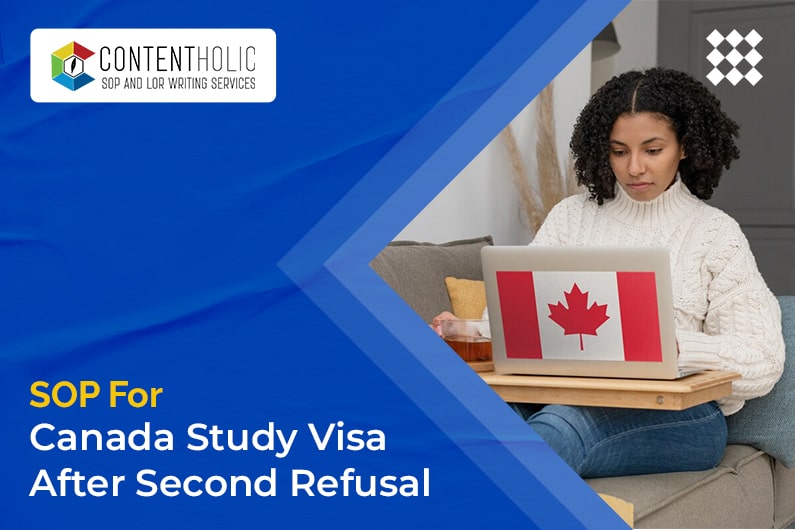Many students have the goal of travelling to Canada to seek higher education. It might be demoralising to receive a second rejection on your student visa application. But do not worry; the Statement of Purpose (SOP) can be used in this situation as a potent tool for atonement.
The SOP for Canada Study Visa After Second Refusal is a unique opportunity to present your case and address any concerns raised in the previous refusals. It provides a platform to showcase your genuine intentions, academic aspirations, and commitment to abide by the immigration regulations.
In this blog, we delve into the key strategies and insights to craft a compelling SOP that addresses the concerns of the visa officer, highlights your genuine passion for studying in Canada, and demonstrates your ability to contribute positively to the Canadian society. Unlock the secrets to a persuasive SOP, and regain confidence in your study visa application. Let us guide you on the path to success as you turn the tables and transform a second refusal into a stepping stone towards your educational goals in Canada.
What is SOP for Canada Study Visa after Refusal?
The Statement of Purpose (SOP) for Canada Study Visa after Refusal is a crucial document that provides applicants with an opportunity to address previous visa refusals and present a compelling case for reconsideration. This SOP serves as a platform for applicants to explain their intentions, clarify any misunderstandings, and provide additional information to strengthen their visa application.
When crafting the SOP after Visa refusal, it is important to thoroughly analyze the reasons for the previous refusal and address them directly. This may involve providing further evidence of financial stability, clarifying study plans, or addressing any concerns raised by the visa officer.
When drafting your SOP for Canada Study Visa after Refusal, it is vital to construct a narrative that is transparent and sincere. Emphasize the authentic reasons behind your desire to pursue education in Canada and how it will positively impact your academic and career objectives.
Furthermore, it is essential to highlight your connections to your home country, such as family, employment, or community ties, illustrating your intention to return after completing your studies. Presenting a strong academic profile, showcasing relevant achievements, and explaining how the Canadian education system aligns with your aspirations can also strengthen your case.
It is vital to carefully review the Letter of Explanation after Refusal and any accompanying documents to address the specific concerns outlined. Seeking guidance from immigration professionals or consultants can provide valuable insights and assistance in crafting a persuasive SOP for Canada Study Visa After Refusal.
What are the Canada Study Visa Rejection Reasons?
In order to understand the essential tips for crafting a well-written SOP for a Canada Study Visa, it is important to be aware of the common reasons for visa rejections. Let’s examine these factors:
- Financial Stability: Canada is known for its high cost of living, making financial stability a crucial aspect for visa approval. The visa panel seeks documentation that demonstrates your ability to financially support yourself during your studies. Failing to include this information in your SOP can lead to rejection.
- Insufficient Evidence of Return to Home Country: Canadian immigration policies emphasize the importance of applicants returning to their home country after their visa expires. If you fail to provide strong reasons for your intention to return, your SOP may be rejected. Discussing plans to launch a business or pursue a career in your home country can instill confidence in the panel.
- Academic Qualifications: Canada is home to prestigious universities, and competition for admission is intense. Failing to meet the academic requirements set by the panel can result in a rejected SOP. Addressing why you have chosen your desired course and explaining any gaps in your academic background can strengthen your SOP.
- Inadequate Documentation: Attention to detail is crucial when submitting your application. The panel carefully reviews the documents provided as evidence. Failure to include essential documents or submitting incomplete information can lead to visa rejection. Ensure that you include all requested documents and thoroughly check them for accuracy.
- IELTS or TOEFL Scores: Meeting the minimum qualifying scores for language proficiency exams, such as IELTS or TOEFL, is vital for visa approval. Each university sets specific requirements for these exams, and failure to meet the minimum scores can result in rejection. Prioritize achieving the required scores when preparing your SOP after a visa refusal.
How should SOP be formatted after a visa refusal?
Upon rejection, the format and content of the SOP become important considerations when writing a study application for a Canada study visa. Addressing the specific reasons behind the visa refusal is crucial, since failing to do so may result in another refusal. An effective SOP should focus on addressing the previous concerns.
To structure your SOP effectively, consider the following sections:
- Candidate Introduction: Begin with a strong and engaging introduction that captures the reader’s attention. A compelling introduction can make a significant impact and set a positive tone for the rest of the SOP.
- Education Background: Integrate the details of your education background into your statement of purpose, emphasizing the relevance of your chosen course and academic history. Connect your educational journey to the reasons for visa refusal, showcasing how you have addressed any concerns.
- English Proficiency / IELTS Score: Highlight your English proficiency, particularly if the visa refusal was related to language requirements. If your IELTS scores are not optimal, it is important to demonstrate improvement and a commitment to enhancing your language skills.
- Reasons for Choosing Canada: Clearly articulate your motivations for choosing Canada as your preferred study destination over your home country. Provide a detailed explanation to convey your deep interest and genuine intent to pursue your education in Canada.
- Financial Support: Address the financial aspect and clarify who will be responsible for funding your education and stay in Canada. Provide relevant information about your family and financial situation to assure the admissions officers that you have a solid plan in place.
- Future Plans and Family Ties: Emphasize your strong ties to your home country and outline your future plans that align with your home country’s development. Assure the visa officers that you have no intention of overstaying and that you have well-defined goals to contribute back to your homeland.
- Conclusion: End your SOP on a positive and memorable note. Use a clever or impactful quote or line to make a lasting impression, reinforcing your genuine desire for a visa permit while expressing gratitude for the opportunity.
At Contentholic, we provide specialized assistance for crafting an SOP for Canada Study Visa after second refusal. Our experienced team understands the intricacies of the application process and works closely with you to address the specific reasons for your previous rejection. We guide you in presenting a compelling narrative that highlights your motivations, academic background, and future plans, increasing your chances of a successful visa application.







Hello, should I submit both the LOE and SOP after the Visa refusal?
Hi Anamika,
You can simply prepare a well-written letter of explanation (LOE) after Canadian Visa Refusal and submit it with your new visa application. You should address the refusal grounds first and then write all the other details as you submitted in previous Canada Visa SOP to give all information in single document, it is not necessary to submit LOE and SOP together.
For more details, you can visit the blog where we have also shared LOE for Canada Student Visa After Refusal